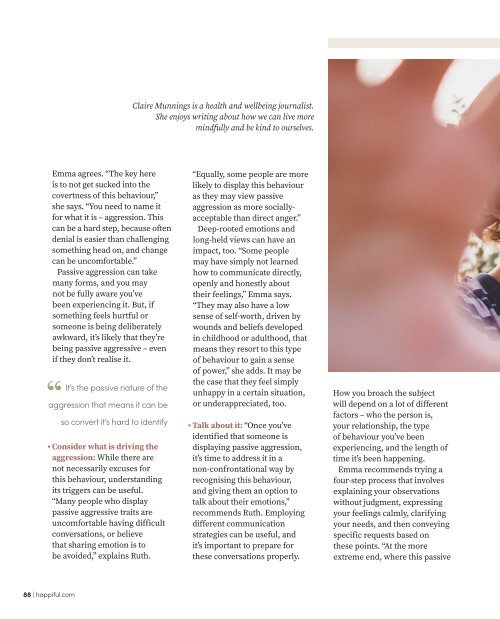You also want an ePaper? Increase the reach of your titles
YUMPU automatically turns print PDFs into web optimized ePapers that Google loves.
Claire Munnings is a health and wellbeing journalist.<br />
She enjoys writing about how we can live more<br />
mindfully and be kind to ourselves.<br />
Emma agrees. “The key here<br />
is to not get sucked into the<br />
covertness of this behaviour,”<br />
she says. “You need to name it<br />
for what it is – aggression. This<br />
can be a hard step, because often<br />
denial is easier than challenging<br />
something head on, and change<br />
can be uncomfortable.”<br />
Passive aggression can take<br />
many forms, and you may<br />
not be fully aware you’ve<br />
been experiencing it. But, if<br />
something feels hurtful or<br />
someone is being deliberately<br />
awkward, it’s likely that they’re<br />
being passive aggressive – even<br />
if they don’t realise it.<br />
It’s the passive nature of the<br />
aggression that means it can be<br />
so convert it’s hard to identify<br />
• Consider what is driving the<br />
aggression: While there are<br />
not necessarily excuses for<br />
this behaviour, understanding<br />
its triggers can be useful.<br />
“Many people who display<br />
passive aggressive traits are<br />
uncomfortable having difficult<br />
conversations, or believe<br />
that sharing emotion is to<br />
be avoided,” explains Ruth.<br />
“Equally, some people are more<br />
likely to display this behaviour<br />
as they may view passive<br />
aggression as more sociallyacceptable<br />
than direct anger.”<br />
Deep-rooted emotions and<br />
long-held views can have an<br />
impact, too. “Some people<br />
may have simply not learned<br />
how to communicate directly,<br />
openly and honestly about<br />
their feelings,” Emma says.<br />
“They may also have a low<br />
sense of self-worth, driven by<br />
wounds and beliefs developed<br />
in childhood or adulthood, that<br />
means they resort to this type<br />
of behaviour to gain a sense<br />
of power,” she adds. It may be<br />
the case that they feel simply<br />
unhappy in a certain situation,<br />
or underappreciated, too.<br />
• Talk about it: “Once you’ve<br />
identified that someone is<br />
displaying passive aggression,<br />
it’s time to address it in a<br />
non-confrontational way by<br />
recognising this behaviour,<br />
and giving them an option to<br />
talk about their emotions,”<br />
recommends Ruth. Employing<br />
different communication<br />
strategies can be useful, and<br />
it’s important to prepare for<br />
these conversations properly.<br />
How you broach the subject<br />
will depend on a lot of different<br />
factors – who the person is,<br />
your relationship, the type<br />
of behaviour you’ve been<br />
experiencing, and the length of<br />
time it’s been happening.<br />
Emma recommends trying a<br />
four-step process that involves<br />
explaining your observations<br />
without judgment, expressing<br />
your feelings calmly, clarifying<br />
your needs, and then conveying<br />
specific requests based on<br />
these points. “At the more<br />
extreme end, where this passive<br />
88 | happiful.com

















